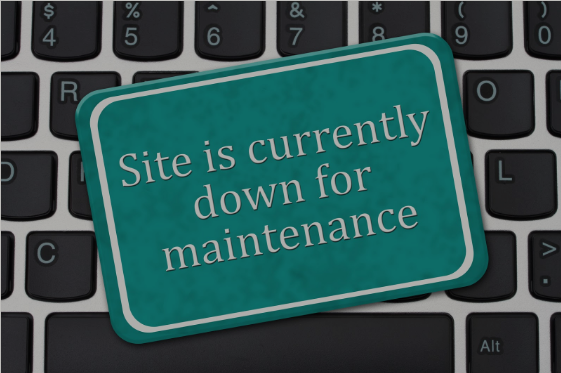Tag: Hosting

The Beginners Guide To Dealing With Website Downtime
According to recent research, the average website is down for about three hours per month as a result of downtime to web hosting servers. The 99.9% uptime guarantee and refund policies offered by most to hosting provider, won't matter if you have lost traffic as a result of downtime. On average businesses can lose $10.6 million a year as a result of website downtime. What Are The Major Causes Of Website Downtime? Website downtime occur for reasons,some of them include: Website code issues: poor programming can cause heavy loads on servers which leads to database error then eventually, makes the site unresponsive Hacker attacks: a website can be brought down by attack from hackers in various ways - the server can be overloaded with DOS attacks, or malicious code is injected to steal security credentials - either way, the website owners are often forced to shut down the site in order to resolve the problem. Data Centre issues: downtime can be caused by the hosting company itself. In this instance, uptime monitoring tools come in handy because they allow you to track the reliability of your web hosting company. Increased traffic: increased traffic is probably one of the leading causes of website downtime. The only way to keep your site up and running even when there is a traffic surge is to engage the services of a reliable web hosting provider - a fully functional optimized website would be useless if your web host is unreliable. How To Protect Your Website From Downtime It's been established, website downtime can negatively impact an online business bottom line, therefore it is important to have protective measures in place to safeguard your business. Some of these methods include: DNS management: is a service that automatically reroutes traffic from the affected server to a secondary server. Backup recovery: setting up a secondary hosting account with a different hosting provider on a different server is a great backup option, that makes it easy for you to get your website online if your primary server experiences downtime CDN: this network will basically store and deliver all cached content from your website and will protect it, in the occurrence of any short time downtime. The combination of DNS management, a content delivery network (CDN) and a backup host- backup listing will go a long way in protecting your website from experiencing short or long-term downtime. How To Avoid Prolonged Downtime With A Great Website Recovery Plan Website downtime is unavoidable -site updates, extreme weather or equipment upgrade can cause website downtime. A website recovery plan and backup are are important to keep unplanned downtime from adversely affecting your business. Before setting up a website backup and recovery plan, you would need to put up - website monitoring systems in place to track website uptime. These monitoring tools provide vital information regarding website performance and availability. With these tools, you can create a different test (checks on your website), to accurately narrow down the root cause of the problem and take adequate steps to correct it. These checks have to be set up outside of the basic HTTPS check the include-checking against known databases of virus and malware sources, record changes to DNS records and so on. Set up a downtime page The best time to set up a downtime page is when you still have access to your website. It comes in handy when there unplanned downtime or planned downtime. This page informs your visitor that you are on top of the situation. Putting up a 'service unavailable' or a 'website undergoing maintenance' message on a page is a great way to keep credibility and show that you have control of the situation. How To Handle Website Downtime 1. Confirm site downtime: before taking any major step, you need to verify that your website is really down - that is, make sure it isn't a problem with your Internet connection or browser. To be extra certain, use a different computer to test out your website. 2. Find the cause: you should try to ascertain what caused the downtime -hardware issues, a programming error, expired domain or a DNS problem? 3. Get in touch with IT support: get in touch with the support of your web host and get assistance for the issue. if you choose a great web host, you should have ready support available. 4. Inform your website users about the downtime: it is imperative that your website visitors are not left in the dark. Put out messages on your social media account to keep your customers informed about what is going on and that your business is taking steps to address the problem. If it is a planned all downtime, it is good practice to send out a warning message detailing the date and time of site maintenance. 5. Check-in with IT: communicate regularly with IT and offer any information they may need regarding the web server or your website. You should also get an estimate of how long it would take for the problem to be solved. 6. Remain calm: this is tough to do but it is important to remember that website downtime can affect anyone and it is not the end of the world. Keeping calm is a great way to stay on top of the situation and resolve it quickly. In Conclusion A website is an integral part of a business's online success. Because of the great number of website downtime, it is imperative that downtime is dealt with swiftly to avoid long-term repercussions -loss of clients loyalty, the revenue. Thankfully, major search engine websites like Google have put measures in place to help website owners mitigate SEO ranking damage by providing a way out. Read Also: What Makes A Good Mobile Website 7 Advantages Of Using Website Design Templates Winning Tactics To Build A Competitive Service Delivery Website
READ MOREDetails
Why A2 Hosting Is One Of The Best Hosting
Managed WordPress Hosting has gained much popularity among web hosting providers, it is a hosting plan that is exclusively designed for WordPress. The aim of this plan is to ease the stress of WordPress users by taking responsibilities for most technical aspect while leaving contents generation to the website owner. Cool! Right? Someone will be maintaining your website while you will be posting contents. And this is not even the only benefit of Managed WordPress Hosting, there are more. Managed WordPress Hosting is a name generated for the concept of the hosting plan “to manage WordPress websites on behalf of the owner”, so it is not exclusive to any web hosting service provider but is variably packed with features from one provider to another. A2hosting.com Managed WordPress Hosting is the best deal you can get. It offers so many awesome features that will definitely surprise you, some of the features are; 20X turbo server, free JetPack personal license, site staging, WP-CLI (WordPress Command Line Interface) and many more. Advantages of A2Hosting Managed WordPress Hosting: Super-fast: 20X faster than typical hosting server is tested and confirmed, so it is very real. Website speed has a lot to contribute to traffic, user experience and SEO. A2Hosting Managed WordPress Hosting is a dedicated hosting plan where a website is isolated with more than enough resources. Security: a website hosted on a dedicated server is almost hack-proof because its isolation decreases vulnerability to attacks. Plus A2hosting has installed firewalls and have security experts monitoring your server 24/7 for any suspicious activities. Automatic backup/updates: what is more comforting than never having to worry about updating your WordPress core files and its components. Your sites content and database will be automatically backed up every single day and you will have access to various restore points just in case you decide to roll back. 24/7 uptime and supports: customers support is one of the very sure ways of solving problems quickly, solving problems is even faster when you can contact customer support and have your solutions immediately; such is the case with A2hosting customer supports team, they are fast, reliable and always available. Furthermore, there is no such thing as downtime on A2hosting servers, you will only experience 99.9% uptime. Developer Tools: various tools such as code editor and debugger, site-staging tools etc. are available for developer’s convenience. Who needs A2hosting Managed WordPress Hosting? Everybody that has a WordPress website does need A2hosting Managed WordPress Hosting plan. It is useful for small, medium or large websites. Even if your WordPress website is currently small or medium size, do you doubt it can later boom off? And that is why you need to be prepared with adequate resources. For larger websites, there is a no better option to run their WordPress website with less hassle. A2hosting Managed Wordpress Hosting is affordable and has three different plans suitable for your individual hosting needs. Get more information or purchase via https://www.a2hosting.com/wordpress-hosting/managed/compare. Read Also: What Makes A Web Hosting Good? Cloud Hosting: Top Five Reasons To Take Your Business To The Cloud
READ MOREDetails
Cloud Hosting: Top five reasons to take your business to the cloud
Cloud hosting refers to the potential of making websites and applications available on the Internet with the help of the cloud. Since the previous couple of years, cloud hosting services have gained a lot of popularity. Not only do they have a lot of benefits but also the way of the future. Here are five reasons you should move to the cloud. Easier collaboration and maintenance : Gone are the times when all your documents and data was saved on hard drives and you' had to either back it up or regularly or risk losing all of your valuable data. By putting your data and software on the cloud you can make all your data resources available online anytime, at any place, from any device. The central hub of your system is no longer the hard drive. Using the cloud to store your data will make it easier to collaborate and maintain your data as all of your data is stored in one location instead of different hard drives and partitions. Easier access to data : The times of carrying hard drives and flash drives with you on business trips are gone. By putting your data in the cloud, you don’t have to worry about copying presentations on to flash drives that can easily be lost or misplaced. If you transfer your business to the cloud, all your data resources will be at your fingertips no matter where you go. Of course, the place has to have an internet connection but in today’s day and age what place doesn’t? Saves budget : By taking your business to the cloud, you can significantly reduce the amount of money you spend to set up and maintain your data resources. You don’t have to spend any more resources on data centers, large hardware arrays, hard drives, rental space to build your servers, or any similar expenses. By using the cloud, you can utilize space that belongs to somebody else and use it as long as you require. Also, you only have to pay for what you use. This way, you can easily adjust usage based on your income and server demands. This feature of the cloud-based business is great for businesses that have varying demands. You can always increase the storage space and computing resources as you require. At the same time, you can reduce them when you don’t need them. Also, the budget you spend on employees to manage your servers is also saved. Improved data security : Keeping your data in the cloud is likely far safer than building your own servers. Most cloud providers put loads of effort into keeping the data of their clients free from unauthorized access by cybercriminals and government interference. The physical security conditions of server farms are generally quite better, too, as server farms are kept under 24-hour surveillance and strict lock. Hostiserver.com is an online hosting provider that is well known for its security and many automated features it provides. It is the way of the future : Frankly, you will have to take your business to the cloud now or later if you don’t want to be left behind. Cloud-based business in the gateway to innovation and as we progress towards a paperless environment, it is becoming a sudden necessity. Read Also : Things You Should Know About Web Host Providers What Makes A Web Hosting Good? 7 Reasons Why You Should Be Using A CDN With WordPress
READ MOREDetails















